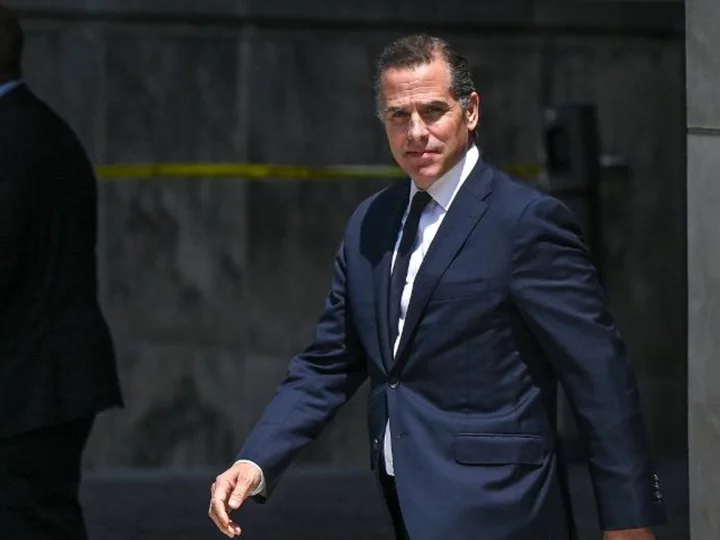A version of Hunter Biden's proposed agreements with federal prosecutors was made public Wednesday night by Politico, providing further insights into the convoluted legal deals that nearly collapsed under scrutiny from a federal judge at his plea hearing earlier in the day.
Politico published an undated and unsigned plea agreement, describing the deal for the president's son to plead guilty to two federal tax misdemeanors. A "statement of facts" is attached, and provides a detailed narrative of Biden's failure to pay nearly $2 million in taxes on time.
The outlet also published a "diversion agreement," describing a separate deal where Biden can avoid prosecution on a felony gun charge if he stays sober and doesn't break the law for two years. Another "statement of facts" is attached, describing how he committed a crime by falsely swearing on a federal form that he wasn't addicted to drugs when he bought a gun.
The gun deal published by Politico was dated Wednesday and signed by Biden, his attorney and the lead Justice Department prosecutor who spoke during the court hearing.
All four documents, as posted online, are broadly consistent with what was said at Biden's derailed plea hearing on Wednesday. While in court, prosecutor Leo Wise extensively quoted from and paraphrased the tax plea deal, the gun deal and both statements of facts.
In the criminal justice system, plea deals often look like this: The defendant broadly admits to their criminal conduct and prosecutors agree to only file charges for some of these crimes, as well as promise that they won't bring charges for the other admitted crimes.
A key sticking point in Biden's case was how just far that immunity would go.
"This is kind of a big blunder on the part of the parties -- both the government and particularly Hunter Biden's attorneys -- to have walked into the room... and not been clear about what they were actually agreeing to, and what charges were going away," Elliot Williams, a CNN legal analyst and former federal prosecutor, said on CNN's "The Situation Room" on Wednesday.
Immunity dispute
The gun deal, as posted online and read aloud by Wise, defined the scope of the immunity.
"The United States agrees not to criminally prosecute Biden, outside of the terms of this Agreement, for any federal crimes encompassed by the attached Statement of Facts (Attachment A) and the Statement of Facts attached as Exhibit 1 to the Memorandum of Plea Agreement filed this same day. This Agreement does not provide any protection against prosecution for any future conduct by Biden or by any of his affiliated businesses," the deal said.
Simply put, this means the Justice Department agreed not to further charge Biden with crimes described in the tax-related statement of facts or the gun-related statement of facts.
Under the deal, felony tax evasion charges were off the table, Wise told the judge.
But District Judge Maryellen Noreika pointed out Wise's criminal probe was "ongoing" and the "statement of facts" mentioned activities could implicate a foreign lobbying law called the Foreign Agents Registration Act.
The statement of facts highlights Biden's board seat at "a Ukrainian energy company," his ties to a "Chinese business conglomerate," his involvement with "a Chinese private equity fund" and his legal work for a Hong Kong politician later convicted in a global bribery scheme.
Noreika asked if the Justice Department could still bring FARA charges later on, even with the plea deal in place. Wise said yes but Biden's attorney Chris Clark said, "I don't agree."
"DOJ apparently reads that to mean only the tax stuff that's talked about in the actual text" of the statement of facts, CNN senior legal analyst Elie Honig said on "CNN This Morning" on Thursday. "Hunter Biden's lawyers said they sort of understood it to mean anything in the periphery, anything that might touch on his foreign dealings at all. That was the disconnect."
That disagreement -- an unexpected and tense moment -- nearly derailed everything. After a recess, Clark came back and conceded to Wise's interpretation of where the immunity ended.
Constitutional questions
The proceedings were back on track, but went off the rails again, when Noreika repeatedly voiced significant "concerns about the constitutionality" of a critical provision in the gun deal.
As part of the "diversion agreement," Hunter would avoid prosecution on the felony gun charge if he passed court-supervised drug tests for two years, stayed out of legal trouble, and followed other rules. The parties wanted Noreika to oversee his compliance, and if prosecutors believed Hunter Biden broke the rules, both sides could present evidence, and she'd issue a ruling.
"To err on the side of caution, they wanted to bring in a neutral third party, the court, to make those kinds of decisions," said Michael Zeldin, a former prosecutor with the Justice Department. "But she said that is an executive branch function. She's not here to referee that dispute."
Neither side could convince Noreika to move forward. She ended the hearing without accepting the plea and told both sides to file more legal briefs defending the deal in the next 30 days.
"What I want to know is: since the judge was shown this diversion agreement ahead of time, why didn't she call the parties and talk this out beforehand? Why wait until the hearing?" Zeldin said. "That would have been more normal. But nothing has been normal so far in this case."

